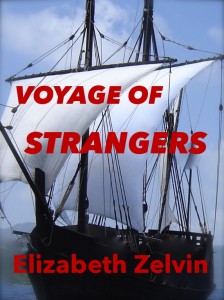 Relevant History welcomes back Elizabeth Zelvin, a New York City psychotherapist and mystery author best known for her series featuring recovering alcoholic Bruce Kohler. Voyage of Strangers, her first historical novel, is the sequel to the Agatha-nominated short story “The Green Cross,” which first appeared in Ellery Queen’s Mystery Magazine and introduced the young marrano sailor Diego Mendoza and Admiral Columbus. Liz is a three-time Agatha Award nominee and a Derringer Award nominee for Best Short Story. She has also released a CD of original songs, Outrageous Older Woman. For more information, check her author web site and look for her on Facebook.
Relevant History welcomes back Elizabeth Zelvin, a New York City psychotherapist and mystery author best known for her series featuring recovering alcoholic Bruce Kohler. Voyage of Strangers, her first historical novel, is the sequel to the Agatha-nominated short story “The Green Cross,” which first appeared in Ellery Queen’s Mystery Magazine and introduced the young marrano sailor Diego Mendoza and Admiral Columbus. Liz is a three-time Agatha Award nominee and a Derringer Award nominee for Best Short Story. She has also released a CD of original songs, Outrageous Older Woman. For more information, check her author web site and look for her on Facebook.
*****
Every American schoolboy and schoolgirl knows about King Ferdinand and Queen Isabella of Spain. They’re the kindly couple who believed Columbus when he said the earth was round, and Queen Isabella sold her jewels so he could set sail to discover America. Right? Wrong!
By 1492, everyone knew the earth was round and that land lay on the other side of what they called the Ocean Sea. Columbus’s minority opinion was that those far-off lands lay a lot closer than everyone else thought they did. When he got to the Caribbean islands, he thought the mainland was bound to be just beyond them. He’d even prepared by bringing along a converso who spoke Hebrew, so he could converse with the Great Khan. Till the day he died, he believed he’d found the Indies.
Ferdinand of Aragon was 17 and Isabella of Castile was 18 when they married in 1469, uniting the two kingdoms. It was a political alliance, not a love match. While it eventually produced a nation called Spain, their realms remained separate entities. They moved their court around from city to city to maintain their dominion over a fragmented whole. The court was installed in Cordoba, which had been wrested from the Moors in 1236, when the monarchs finally agreed to back Columbus’s exploratory voyage in 1492 and in Barcelona, more than 500 miles away, when he came to report his success and lay his spoils at their feet in 1493.
Ferdinand and Isabella were exceptionally devout Christians by the standards of the day. They introduced the Inquisition in Castile in 1478 and were hand in glove with Pope Alexander VI—the Spaniard now remembered as the infamous Borgia Pope—from his accession in 1492. Ferdinand and Isabella’s mission was conquest, with the desire to increase the power of the crown and the prosperity of the realm inextricably intertwined with the determination to eradicate all that was not Christian, ie. Catholic, from the lands they ruled.
The monarchs totted up an impressive record for genocide and persecution. In 1492 alone they conquered Granada, the last Moorish stronghold, driving out or enslaving the remaining Muslims, and expelled the Jews on the very day that Columbus set sail.
They continued their predecessors’ conquest of the Canary Islands, whose indigenous people, the Guanche, ended up much like the Taino of the Caribbean, ie. close to extinction, their legacy reduced to fragments of a lost language and culture and the bit of DNA remaining in the modern population. They also persecuted the Roma, often called gypsies, whose peripatetic lifestyle was partly due to laws forbidding them to settle down in one place—much as medieval Jews acquired a reputation for expertise in banking by being forbidden to join any of the craft guilds that would have given them a broader choice of occupations.
Ferdinand and Isabella were quick to exploit the wealth of the Jews. Conversos, Jews who had expediently converted to Christianity, became their bankers. While they saw the Jews’ expulsion as a holy mission, it’s no coincidence that the Jews were required to leave their considerable wealth behind—and that their loans not only to the sovereigns, but to the Spanish aristocracy in general, were canceled by their departure. One of the modern arguments for the possibility that Columbus was Jewish is that his voyage was financed not by Isabella but by converso bankers. I don’t believe it happened that way at all. I can imagine Isabella saying: “I’d like to give this crazy man a shot. If he finds the Indies, the profits will be enormous. Portugal dominates trade around the coast of Africa, but a passage to the Indies to the west would be all ours. It costs me nothing to say I’ll pledge my jewels if need be. I’ll order the converso bankers to cover the cost. They won’t dare refuse. And when they see what happens to the Jews who cling to their heretical faith, they won’t dare ask for repayment.”
Several other arguments for Columbus being Jewish fail to convince. One early proponent of the theory was a Spanish Fascist who wrote in 1940 that Columbus’s greed for gold suggested he had “Jewish blood.” Anyone but a neo-Nazi would laugh that off today. Ferdinand and Isabella, not to mention all the Spaniards who accompanied Columbus on his voyages, had a greater lust for gold than Columbus himself, whose greatest wish was to bring an abundant return on their investment to the King and Queen. When gold proved to be in shorter supply in Hispaniola than expected, he made up the shortfall by taking Taino slaves and transporting them across the sea in conditions as appalling as those in the slaving ships of the 18th and 19th centuries.
Some modern Jewish scholars claim that Columbus was seeking a Jewish homeland, a New World Israel. This is a fashionable idea today. But first, it was the Christians, not the Jews, who longed to expel the Muslims from Jerusalem in the later Middle Ages—hence the Crusades. Second, Columbus expected to find existing civilizations open to trade with Europe, not empty lands. And third, the King and Queen made it perfectly clear when they agreed to sponsor the second voyage that all lands claimed and gold mined or collected became the property of the Crown. The sailors, soldiers, and settlers who crossed the sea in 1493 were not entitled to seize these riches for themselves. I doubt that any of them took this stricture seriously—except Columbus himself, whose own words in his logs and letters reveal him as a deeply devout Christian and devoted champion of his King and Queen.
*****
 A big thanks to Elizabeth Zelvin. She’ll give away two prizes to someone who contributes a comment on my blog this week: an electronic copy of Voyage of Strangers in .mobi (Kindle) or .pdf format, and a copy of the Ellery Queen’s Mystery Magazine issue that includes her Agatha award-nominated short story “The Green Cross.” I’ll choose the winner from among those who comment by Friday at 6 p.m. ET. Make sure you leave your email address.
A big thanks to Elizabeth Zelvin. She’ll give away two prizes to someone who contributes a comment on my blog this week: an electronic copy of Voyage of Strangers in .mobi (Kindle) or .pdf format, and a copy of the Ellery Queen’s Mystery Magazine issue that includes her Agatha award-nominated short story “The Green Cross.” I’ll choose the winner from among those who comment by Friday at 6 p.m. ET. Make sure you leave your email address.
**********
Did you like what you read? Learn about downloads, discounts, and special offers from Relevant History authors and Suzanne Adair. Subscribe to Suzanne’s free newsletter.

Thanks for having me on the blog, Suzanne.
You’re welcome, Liz. Your post is a great reveal for anyone who still views Ferdinand and Isabella through the glamor of elementary-school history class. A wonderful topic to kick off Relevant History for 2014.
Ferdinand and Isabella have a lot to answer for. The research I did for my protagonist’s Sephardic wife bears out your understanding of the times. Thanks for setting the record straight.
Thanks for stopping by, Bev. You’ve depicted the character of Liya very well.
Thanks, Beverle. I got more and more indignant as I did the research, and showing it through Diego’s eyes let me get it onto the page without getting on a soapbox about it.
History is a strange thing. You can look at it in any number of ways and still be right. Liz, I loved Voyage of Strangers and it is an look into a world that we usually see cleaned up in history books.
Welcome to my blog, KB! We clean up a lot of worlds for our history books, don’t we?
Thanks, KB. It means a lot to me that you liked the book so much. Eve, what you learn will probably depend on what you read. My two major sources disagreed on an astonishing number of issues. And the contradictions go all the way back to Columbus keeping two log books on the first voyage, one with what he thought was their true progress day to day and one to encourage the crew.
This post has inspired me to learn more about King Ferdinand and Queen Isabella!
Thank you for stopping by, Eve. I admit that after I read the post, I hustled over to Wikipedia to learn more. So much of our history has marched to the step of organized religion.
I’m building up my knowledge (and bookshelf) with historical fiction. So glad I stumbled across this site via DorothyL. Your perspective on Ferdinand and Isabella is fresh to me and I want to know more. History in school was never this insightful or exciting!
Thanks, Sunny. My husband is a history buff who’s learned what he knows from history books, while I’ve learned my history from historical novels, starting way back in childhood–and we know pretty much the same things and can hold an intelligent conversation about the Tudors or the Plantagenets. But I had to do real research for VOYAGE OF STRANGERS. I was blown away by some of the things that really happened. And it was amazing to be able to read Columbus’s own words in his logbook of the first voyage on the Internet.